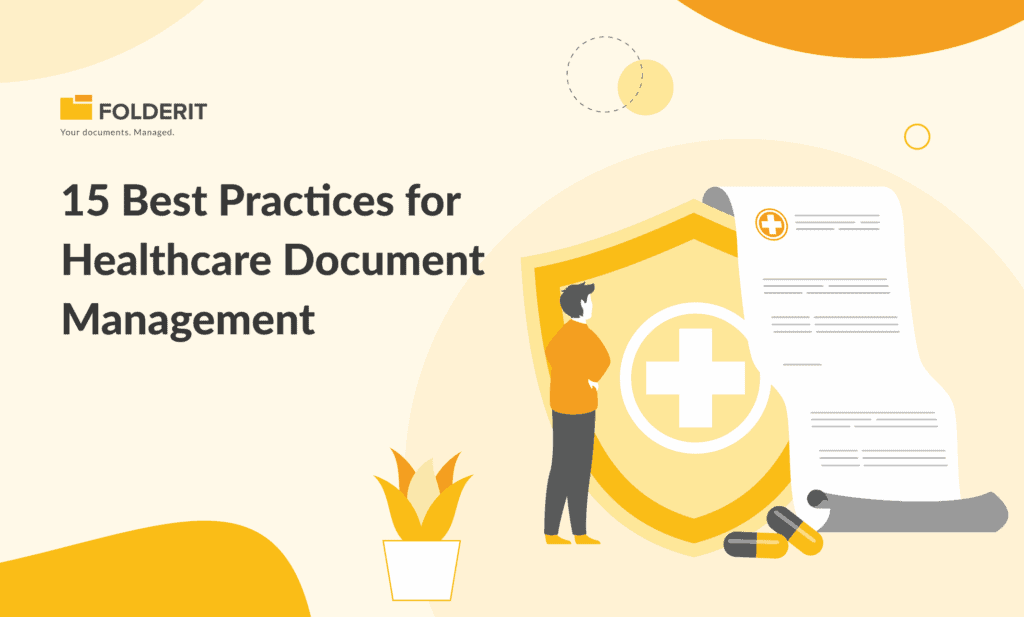
You are using an outdated browser. Please upgrade your browser to improve your experience.
Talha Ahmed Gill

For the healthcare industry managing documents efficiently is more than just about organization, it is a critical component of patient care and regulatory compliance. With the increasing volume of patient records, test results, and other critical documents, healthcare providers must adopt best practices to ensure that these documents are handled securely, efficiently, and in compliance with various regulations.
The first step towards efficient document management in healthcare is embracing digital transformation. Transitioning from paper-based systems to digital records can significantly enhance accessibility and reduce the risk of lost or damaged documents. Digital records are easier to search, update, and share, making them a more practical choice for fast-paced healthcare environments.
Healthcare document management must comply with strict regulations like HIPAA (Health Insurance Portability and Accountability Act) in the United States. These regulations dictate how patient information should be handled, stored, and shared. Ensuring compliance not only protects patient privacy but also shields healthcare providers from legal repercussions.
Given the sensitive nature of healthcare documents, implementing robust security measures is paramount. This includes secure storage solutions, controlled access to sensitive information, and regular audits to ensure that all security protocols are being followed.
Healthcare providers should establish clear policies for document retention. This includes determining how long different types of documents should be stored and the appropriate methods for their secure disposal once they are no longer needed.
Automating workflows can significantly improve the efficiency of document management in healthcare. Automated tools can help in tracking document revisions, managing approvals, and ensuring that documents are reviewed and updated regularly.
Training staff on the best practices of document management is crucial. This includes educating them about the importance of compliance, the proper way to handle sensitive documents, and how to use document management systems effectively.
The healthcare industry is constantly evolving, and so are the best practices for document management. Regularly reviewing and updating these practices ensures that they remain effective and compliant with the latest regulations and technological advancements.
Integrating document management systems with other healthcare IT solutions, such as Electronic Health Records (EHRs) and billing systems, can streamline operations and improve overall efficiency. This integration ensures that all patient-related information is easily accessible in one place.
In healthcare, time is often of the essence. Optimizing document management systems for easy retrieval and searchability can save valuable time. This includes using consistent naming conventions, indexing documents effectively, and implementing powerful search functionalities within the document management system.
Creating a culture where every staff member understands the importance of proper document management and takes responsibility for it is crucial. This involves clear communication of policies and procedures and ensuring that everyone is accountable for their part in managing documents.
Cloud storage solutions offer flexibility and scalability, which are essential in the dynamic healthcare sector. They allow healthcare providers to store large volumes of documents securely and access them from anywhere, which is particularly useful for facilities with multiple locations or for professionals who need remote access.
Version control is vital in healthcare document management. It ensures that everyone is working with the most current information and helps in tracking changes made to documents over time. This is particularly important for patient care documents, where outdated information can lead to incorrect treatment decisions.
In all aspects of healthcare document management, patient privacy and confidentiality must be a top priority. This means implementing strict controls on who can access patient records and ensuring that all staff members understand the importance of maintaining confidentiality.
Data analytics can be used to monitor and improve the document management process. By analyzing data on document access, revisions, and compliance, healthcare providers can identify areas for improvement and make informed decisions to enhance their document management strategies.
Having a disaster recovery plan is essential. This includes backups of all critical documents and a clear plan for restoring document access in the event of a system failure, natural disaster, or other emergencies.
Effective document management is crucial in healthcare, not just for operational efficiency but also for providing high-quality patient care. By following these best practices, healthcare providers can ensure that their document management systems are secure, compliant, and efficient, ultimately leading to better patient outcomes and streamlined operations. As the healthcare industry continues to evolve, staying ahead in document management will be key to success and sustainability.
Recommended articles
Kent

Kent

Talha Ahmed Gill